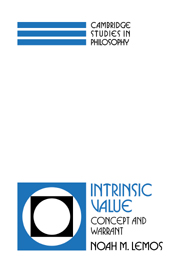Book contents
- Frontmatter
- Contents
- Preface
- Acknowledgments
- Part I Value, plurality, parts, and wholes
- Part II Naturalism, nonnaturalism, and warrant
- 7 The distinctiveness of intrinsic value
- 8 Intrinsic value and modest a priori justification
- 9 Coherence and experience
- Appendix A Chisholm's definition of organic unity
- Appendix B Some naturalistic analyses
- Selected bibliography
- Index
9 - Coherence and experience
Published online by Cambridge University Press: 07 May 2010
- Frontmatter
- Contents
- Preface
- Acknowledgments
- Part I Value, plurality, parts, and wholes
- Part II Naturalism, nonnaturalism, and warrant
- 7 The distinctiveness of intrinsic value
- 8 Intrinsic value and modest a priori justification
- 9 Coherence and experience
- Appendix A Chisholm's definition of organic unity
- Appendix B Some naturalistic analyses
- Selected bibliography
- Index
Summary
In the last chapter, I argued that it is more reasonable to think that we have a priori knowledge and justification of certain value claims if we accept the notion of modest a priori justification instead of restricting ourselves to a strong view that takes basic a priori justification to be certain and indefeasible. In this chapter, I examine two alternative approaches, two alternative answers to the question “What justifies us in believing that something is intrinsically valuable” These are coherence theories and broadly empirical theories that take emotional experiences to be evidence or reasons for value beliefs. I will argue that neither alternative is adequate.
COHERENCE THEORIES
I take a coherence theory of justification to hold roughly that the only thing that confers justification or warrant on S's believing p is the fact that S's believing p coheres with the rest of S's beliefs. Coherence theories, so construed, tell us that a belief is warranted because and only because it coheres with a subject's other beliefs. They tell us that there is one basic or ultimate warrant-conferring characteristic of a belief, namely, belonging to a coherent set of beliefs. There are two fundamentally important features of coherence theories. First, coherence theories deny that there are any basic or foundational beliefs. A “basic” or “foundational” belief is one that has some level of epistemic warrant that does not derive from or depend positively on one's other beliefs or justified beliefs.
- Type
- Chapter
- Information
- Intrinsic ValueConcept and Warrant, pp. 161 - 195Publisher: Cambridge University PressPrint publication year: 1994



